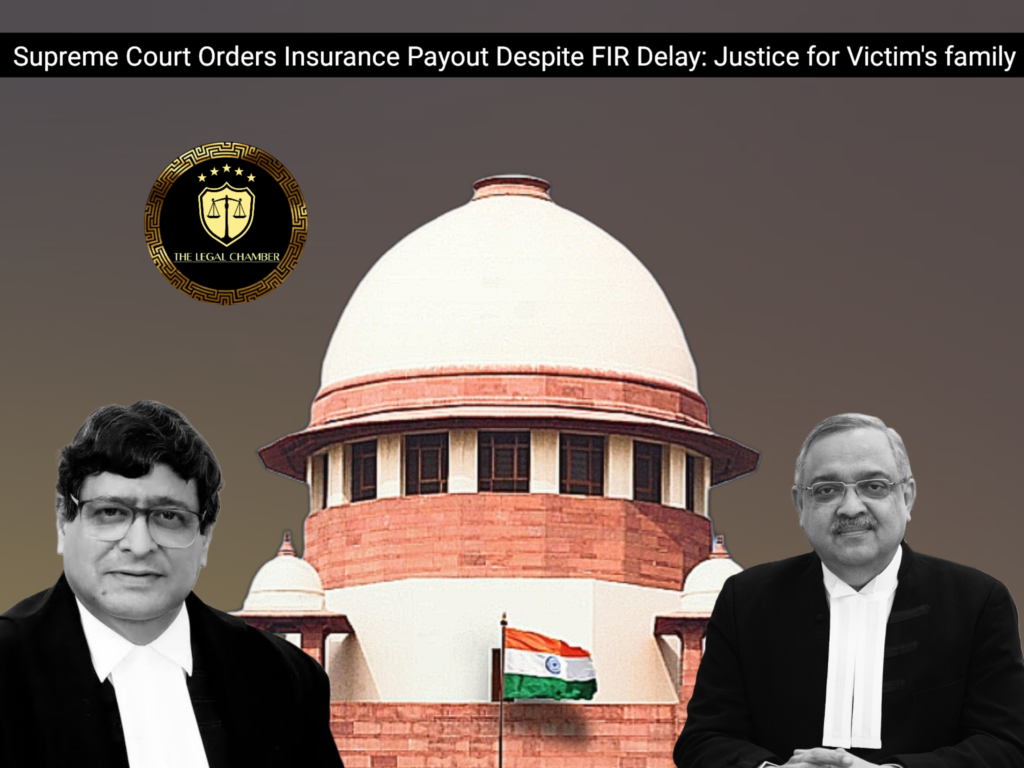
The Supreme Court of India overturned the High Court’s decision, ruling that the delay in FIR registration and minor discrepancies in eyewitness testimony did not disprove the involvement of the offending vehicle in the accident. The Court upheld the Tribunal’s compensation award, emphasizing that the insurer failed to examine the investigating officer to challenge the evidence. The judgment reinforced the principle that technicalities should not override substantive justice in motor accident claims.
Facts Of The Case:
The case involved a motor accident where the deceased, a school peon, died after his motorcycle collided with a speeding vehicle. His wife and three minor children filed a claim before the Motor Accidents Claims Tribunal (MACT), which awarded them compensation of ₹46,29,152. The insurance company appealed to the High Court, disputing the involvement of the alleged offending vehicle, citing a three-month delay in FIR registration and inconsistencies in the eyewitness account. The High Court set aside the Tribunal’s award, doubting the eyewitness’s credibility due to his inability to recall details like the vehicle’s color and registration number, and noting that the FIR was filed belatedly.The claimants then approached the Supreme Court, which examined the evidence, including the Murg report confirming the accident and the FIR registered based on subsequent investigation. The Court held that the delay in FIR filing did not undermine the case, as the accident was promptly reported to the hospital. It also dismissed the insurer’s objections regarding the eyewitness’s testimony, noting that minor discrepancies were natural and did not invalidate his account. The Supreme Court reinstated the Tribunal’s compensation award, directing equal distribution among the claimants, with provisions for the minors’ shares to be held in fixed deposits. The judgment emphasized that procedural lapses should not deny victims their rightful compensation.
Procedural History:
The case originated with a claim filed before the Motor Accidents Claims Tribunal (MACT) by the widow and minor children of a deceased peon who died in a motor accident. The MACT awarded compensation of ₹46,29,152, accepting the claimants’ evidence, including eyewitness testimony. Dissatisfied, the insurance company appealed to the High Court, challenging the involvement of the alleged offending vehicle and highlighting discrepancies in the FIR and witness account. The High Court overturned the MACT’s decision, citing the delayed FIR and inconsistencies in the eyewitness’s description of the vehicle.Aggrieved by the High Court’s reversal, the claimants approached the Supreme Court under Article 136 via a special leave petition. The Supreme Court scrutinized the procedural aspects, including the Murg report confirming the accident and the subsequent FIR. It held that the High Court erred in discrediting the claim based on technicalities, especially since the insurer failed to examine the investigating officer to rebut the evidence. The Supreme Court restored the MACT’s award, emphasizing that procedural delays and minor witness discrepancies should not defeat substantive justice. The judgment concluded the litigation by directing the insurer to disburse the compensation with interest, ensuring equitable distribution among the claimants.
READ ALSO:Supreme Court Explains : When Can Courts Quash Serious Crimes?
Court Observation:
The Supreme Court made significant observations while overturning the High Court’s judgment. It emphasized that the delayed registration of the FIR did not invalidate the claimants’ case, particularly since the accident was promptly recorded in the Murg report and the FIR was later filed after due investigation. The Court noted that minor discrepancies in the eyewitness’s account – such as inability to recall specific details about the offending vehicle – were natural and did not undermine his overall credibility, especially when the core fact of the accident remained undisputed.The judgment criticized the High Court for placing undue reliance on technicalities while ignoring substantive evidence. It observed that the insurance company’s failure to examine the investigating officer weakened its challenge to the FIR’s authenticity. The Court reaffirmed that hyper-technical objections should not obstruct justice in motor accident claims, particularly when the claimants are bereaved family members. Importantly, it highlighted that the Tribunal’s findings on factual aspects like vehicle involvement and liability deserved deference unless perverse. The ruling underscored the compensatory nature of motor accident jurisprudence, prioritizing victims’ rights over procedural irregularities.Additionally, the Court provided specific directions for safeguarding the minors’ interests by mandating fixed deposits for their share of compensation, demonstrating its focus on equitable relief beyond mere legal formalities. These observations collectively reinforced the principle that justice in accident claims must be substantive rather than procedural.
Final Decision & Judgement:
The Supreme Court allowed the appeal and set aside the High Court’s judgment, thereby restoring the compensation award granted by the Motor Accidents Claims Tribunal. The Court directed the insurance company to deposit the awarded amount of ₹46,29,152 along with applicable interest within two months. The compensation was to be equally apportioned among the deceased’s wife and three minor children, with the minors’ shares to be held in fixed deposits until they attained majority, while permitting the mother to access the interest for their welfare. The judgment categorically held that neither the delayed FIR registration nor minor inconsistencies in the eyewitness testimony could negate the established fact of the accident and the claimants’ entitlement to compensation. In its concluding remarks, the Court emphasized that the insurer’s failure to examine the investigating officer or provide contrary evidence proved fatal to its defense. The decision reaffirmed the principle that technical objections should not override substantive justice in motor accident claims, particularly when protecting the rights of vulnerable claimants like bereaved families with minor children. All pending applications were disposed of accordingly, bringing finality to the litigation.
Case Details:
Case Title: Sanju Bai Prajapati & Ors. vs. The New India Assurance Company Ltd. & Ors. Citation: 2025 INSC 823 Civil Appeal No.: (Special Leave Petition (C) No. 13455 of 2023) Date of Judgment: July 14, 2025 Judges/Justice Name: Justice K. Vinod Chandran & Justice Sudhanshu Dhulia
Download The Judgement Here